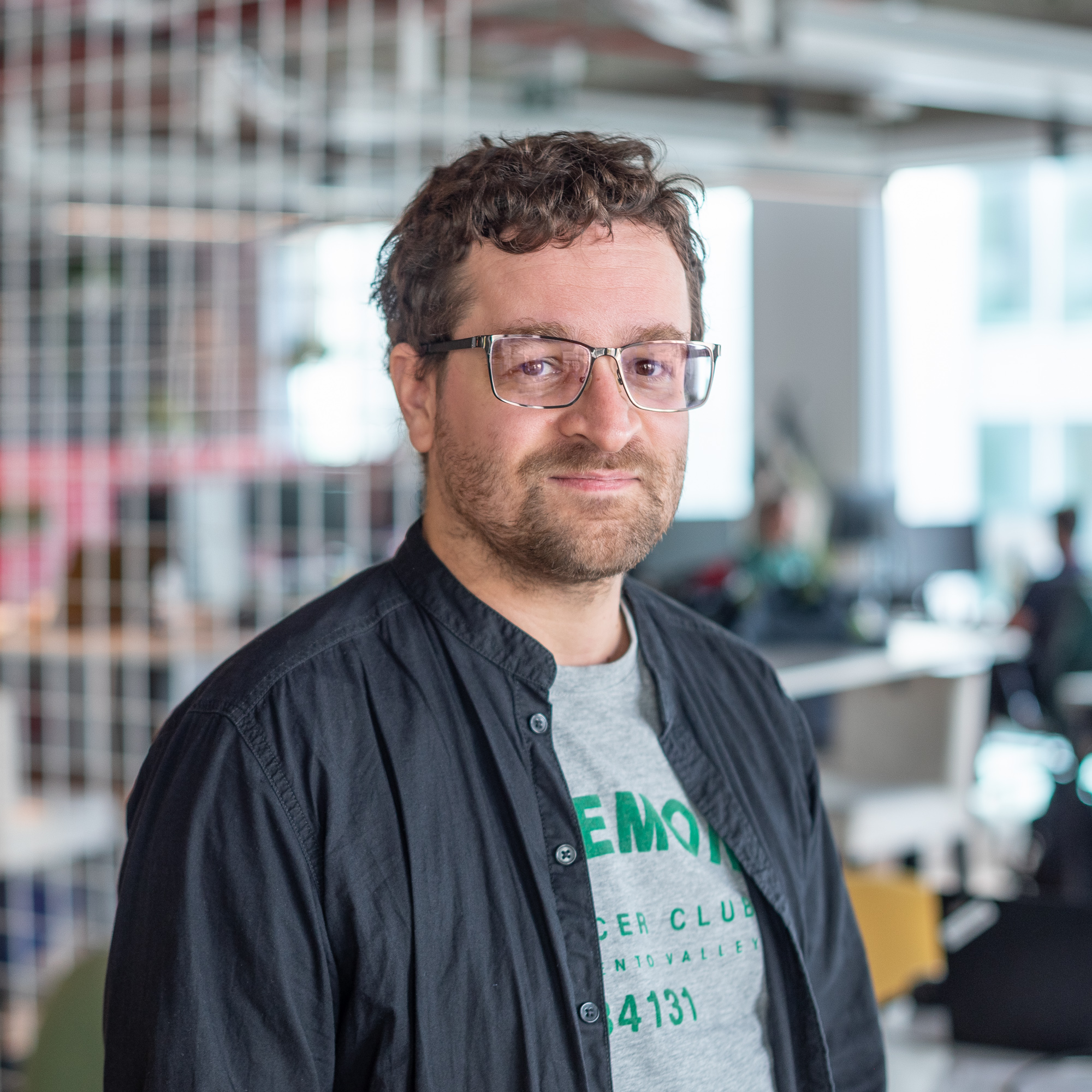Karolina Wysłucha: Music therapy and sales have more in common than you think


Karolina is our Market Research Lead for Poland and she also takes care of Business Development there. In our last interview, she spoke mostly about the Polish market and its specifics. This time we asked her more personal questions about her role in the team and what is her job like. Did you know there are similarities between music therapy and sales? Or how to work with emotions in business? Karolina has all the answers.
What brought you to SharpGrid and the world of data?
A friend of mine saw on Linkedin that BizMachine (former name of SharpGrid) is looking for a Polish native speaker for an internship. It was supposed to be about market research centered on Polish on-trade, finding important insights for the company to create a tailor-made product according to the needs of the market. They basically needed a “local brain” to come up with the right approach.
After a while I was preparing materials for meetings with first Polish clients and prospects and then I started joining those meetings myself, talking to them, trying to understand what they needed. Because to really understand people, you need to speak their language. That’s what SharpGrid cares about. And for that you need a local speaker/brain like me or my colleagues Elena in Spain or Elisa in Italy.
You’ve been doing this for almost three years already. How did your role change over the years?
Well, I was prepared for a three-month internship. But we kind of clicked with one another in SharpGrid and the company wanted me to move forward, to learn more and do more. And I really appreciated that opportunity, because my background had nothing to do with the on-trade appart from the fact that I like going out and experiencing it firsthand.
Was it hard to break into the industry?
That they made it easy for me. I speak fluent English so communication was not an obstacle. They provided me the information I needed and they made me comfortable asking questions, even stupid ones. The most important thing in the beginning wasn’t deep knowledge of the market, but rather being a good communicator. Not being afraid to call someone, ask questions or send an e-mail.

Did you grow to like the on-trade and data industry?
Everyone loves the on-trade because it’s a part of our life connected to having fun or enjoying a drink or meal. But I’d say the best part for me was when I understood that we can really help our clients. And I like to talk as well, so having an opportunity to talk to clients was exciting. I study music therapy and it has a lot to do with communication and psychology so I guess it’s connected to what I’m curious about.
In what way specifically?
You see, communication is a therapy in a way and there is a strong connection between music and languages. Usually people who like music or have musical skills tend to learn languages easier. There is also a connection from the angle of psychology with creating connections and making people trust you. It’s all about building relations. That’s why we have a native representative for each country who can build this trust better than anyone else.
You need to have a lot of empathy, be understanding and persuasive. Don’t be robotic and show some honest human emotions, even in business. People will appreciate it.
What do you enjoy most about the work you do?
I like being with people and communicating in general. I’m always curious about the ways people will react and I’m trying to find ways to be even more professional, to make clients comfortable talking to me. I’m also a control freak so I like my Pipedrive and following my to-dos. I’m quite diligent with tasks I need to do. In this job, I need to be organized.
The thing is, I work in a sales team, but the sale is just an end result of what you do. We’re working on a relationship or even partnership with our clients so that the whole project or cooperation moves forward. And I always think about different ways to approach people, overcome obstacles and make it work. I also like being an investigator and finding the right people to talk to. It's detective work in a way.
Do you have enough support and freedom in your work?
Yes, definitely. My job gives me just the right amount of creative freedom. Martin Nepraš often says “follow your guts” which requires a lot of trust. But we have the right people in the team so it’s natural we trust each other. Even though I’m working full time remotely doesn’t matter that much. There is this trust in SharpGrid that whatever people are doing, they are always doing their best.
What about clients? Do you enjoy working with them?
You can talk for hours about our clients (laugh). What I find interesting is that very often they are interested in knowledge, insights and understanding the market or adopting new innovative technologies. Because better solutions lead to better results and revenue, which matters at the end of the day. Mostly it’s people who are just naturally curious.
In Poland it's a bit harder because I feel there is no equivalent of our company, someone who provides insights about every individual on-trade outlet. I can see how lacking this knowledge might be damaging but if our clients don’t even know these things are possible, they are a bit resistant, because they are not prepared for it, they don’t actively seek it.
That’s actually the biggest issue we need to overcome. Many of our potential clients think that what they have is enough and we need to encourage them that there are many better ways to approach the market, we know them and they are way more efficient. Our way saves time and money, even though it might look the other way around for some people when they hear about it for the first time. So we’re educating the market as well.
Do you think you’re successful in educating the market?
It depends. Some companies want to be data driven. They are already seeking what we offer and when we talk to them they are interested right away. But some companies are stubborn and stuck in the old ways and they feel they don’t need to change anything. That’s our main obstacle we need to solve. It’s not easy. People say you can’t teach the old dog new tricks. But I don’t believe that. It’s always possible, you just need to be open-minded and willing to understand your counterpart from the client side better.
What problems do you help to solve for your clients?
I help them understand the market with our data and products. Things like where to invest more resources or which outlets to target, like a list of potential targets. With our data it’s actually super easy. The problem with clients is that they often don’t have access to the right data and rely on inconsistent manual collection, lacking a lot of information necessary to understand the on-trade channel and invest money wisely. For that, you need to know the whole market. That’s the main difference between us and other providers.
I would say our main goal is to make life easier for our clients.
What do you think about SharpGrid products?
By talking to our clients I can actually see how they are working, what their processes are. And I can see that what we have fits perfectly in what they’re doing. I believe in what we’re doing because we’ve seen examples of how this can be helpful.
It’s just common sense, you know? Everything is going to be data-driven. We live in a digital, internet age. So SharpGrid is exactly at the right place at the right time.
What does your typical day look like?
I need to have a quiet space to think, a good internet connection and a laptop and that’s all I need for my work. I just open my computer and start working from wherever I am.
We also have meetings almost every day. There is a lot of talking about how to approach certain situations or solve some issues or how to move forward with certain projects. It’s always super useful to have someone to discuss strategies and approaches with.

Does being remote have any impact on your work? Do you still feel like a part of a team?
I definitely have support when I need it. I can ask questions when I need answers. So I don’t feel far away. Even if you’re in the office, you need to respect that people are working and don’t distract them with small talk etc. whenever you feel like it. Sure, I’d like to have more time together like going to lunch or an office party. I’d like to be in Prague more often, but Covid made it almost impossible.
What is your role in the team? Can you sum it up?
Describing what you’re doing is like driving a car. You just do it and when you have to explain the moves, it gets complicated. But I’ll try.
My role has changed or progressed several times from being just an intern to becoming a market expert, market research lead and doing business development on top of that.
It’s more and more exciting now with the team getting bigger and I’m curious how it’s gonna be in the future when we expand to even more countries. I like the guys vs. girls balance of energy. I feel each of us is different. It’s kind of amazing how so many different personalities can create such a good team. But maybe that is the key, right? Maybe you need different personalities on the team to make it great.
As a native speaker I’m responsible for business development in Poland so I try to look for opportunities where to grow our business. Basically I’m looking for the right people to talk to to see if we can find common ground. I create relationships. I try to find the right people and give them what they need and to deliver it in a top quality.
I check the quality of our data and provide feedback from clients to our product management. I also provide my own feedback. If I see issues, I want them to be solved right away, even though it’s not always possible. But I do it because I love delivering things people would be happy with. I also communicate a lot, ask questions, prepare materials for meetings and so on. And I’m making sure everything’s delivered on time.
So you can say that I take care of the whole process - from finding the right person to making sure they are happy with the outcome.
What is the relationship between you and your bosses?
What’s great about SharpGrid is that during every discussion, both sides appreciate your ideas and inputs. There is a lot of back and forth. I always feel respected enough that my opinions matter even when I’m talking to people with much more experience than me. They always ask what I think. It’s not like talking to your boss, being afraid to ask anything. We are all parts of the machine and if one part is missing everyone would feel that.
How do you measure success in your role? When can you say “Yeah, I’ve done it today”?
It’s not that much about closing a deal, but about people. I feel the most successful when I create a foundation for cooperation. When I create the opportunity to talk and understand the other side a bit better. I’m learning a lot from that.
So I feel successful when I see the interest. When people read my emails, when they’re interested in what we do. When they ask questions and want to talk to us and proceed further. When there is common ground. That is truly motivating.
So if our job was to build a house, you would lay the foundations.
Yes, exactly.
Okay. And what are the three most important qualities of a person who would like to join the commercial team?
Willing to learn. That’s super important. Being creative would be number two. And being open-minded. But also good communication skills are absolutely crucial. I feel all these things correlate. Like if you’re creative, you’re probably open minded and so forth.
Anything else you want to add?
I just love the team. And I’m looking forward to seeing the company grow.






